Cuban, Shanks predict tech influence on sports media future
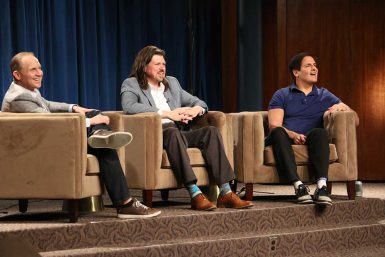
Virtual reality, sports fans’ love of handheld devices and the search for a good story are tantamount to sports media’s future, two IU alumni told a packed house at Whittenberger Auditorium Thursday afternoon.
Who better than Dallas Mavericks owner and entrepreneur Mark Cuban, BS’81, and Fox Sports president Eric Shanks to make predictions. The two were guests of the National Sports Journalism Center’s Sports Media Week.
In a panel discussion led by NSJC director Galen Clavio, the two offered their ideas about the next technological developments that will shape sports media.
Cuban, for example, has been a backer of virtual reality and other technology to help fans put themselves on the field or court. IU’s new Mark Cuban Center for Sports Media and Technology, launched last year with a $5 million contribution from Cuban, introduced virtual reality to IU basketball fans with Samsung Gear VR headsets during a demo earlier in the week.
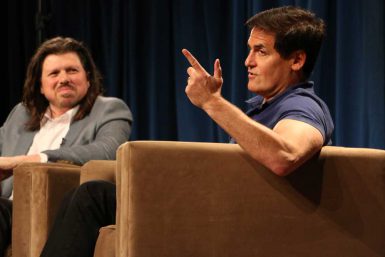
Still, Cuban said that virtual reality in its current state has too many problems for those not in attendance with access to the headsets. For instance, not all users will have the bandwidth on their devices to view footage taken by a 360 camera. Cuban said flaws in virtual reality offer entrepreneurs in sports media an opportunity to master the media through innovation.
Shanks was a bit more optimistic than Cuban about virtual reality and sports media during the press conference before the panel. “We are pretty enamored with the possibility of virtual reality,” he said on behalf of Fox Sports.
During the panel, however, Shanks told students that technological advances in sports media such as the glowing first down line, glowing hockey puck and virtual reality are no replacement for good storytelling.
“We’ve got a lot of what we call ‘toys’ in the sports broadcast industry, but sometimes it’s good to know when to put the toys down and let the moment happen,” Shanks said. “My best producers are actually the ones who do the least.”
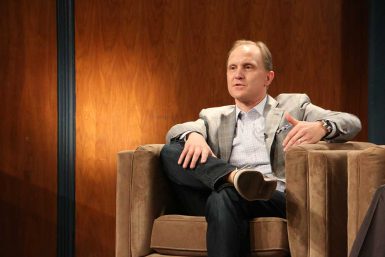
Attendees asked panelists about the effects of technological advances on traditional sports broadcast media. Both talked about the importance of audience experience in the digital age and the shift to a personalized viewing experience.
“Big networks can’t really give viewers exactly what they want, which is to do everything on their phone,” Cuban said. “They have a business to protect, and if they are making billions on television, they can’t just put it all on the phone and all of a sudden make millions.”
Shanks said new technology makes reaching viewers easier and less expensive, but doesn’t remove the challenge of finding a good story.
“We can produce really great feeds for next to nothing on Periscope and Facebook Live,” he said. “The barrier for getting information out is really low. The challenge is to find a story and the personality to tell it.”
In addition to offering their expertise on all things sports media, the pair offered career advice for students who are about to enter the job market.
“I’ve never turned down a job,” said Shanks, who joined Fox Sports in 1994 as a broadcast associate, after working for CBS Sports as an IU student. “Don’t wait around for the perfect job. You can make any job whatever you want it to be.”
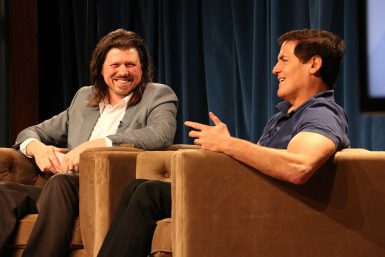
Cuban agreed that students learn something from every job that will ultimately help their professional path.
“Any more, it’s not about having a career. It’s about being a free agent,” he said. “Use every job to build a feature set for yourself that will be a foundation to move forward.”
In a press conference before the talk, Shanks told reporters that in the midst of Fox Sports’ hectic preparation for the upcoming Daytona 500, it was still important for him to return to IU and give advice to students. Shanks, a six-time Emmy winner, said IU holds a special place in his heart.
“The success of any institution is about the people,” said Shanks. “The people here, generation after generation, are really special, and I want to make sure that keeps going.”
Cuban also expressed his excitement to be back at IU and attributed his success to the school.
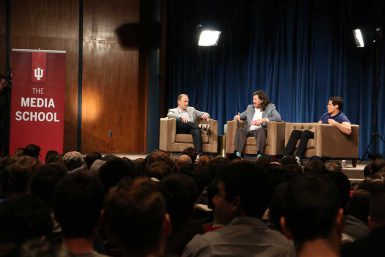
In addition to owning the Mavericks, he has developed a multi-billion dollar streaming software, is CEO of AXS TV and appears on ABC’s television show Shark Tank.
“The best thing IU did for me was it helped me learn how to learn,” he said. “To be successful, you have to keep that thirst to learn and the desire to always stay ahead.”
In addition to the panel talk and the VR demo, Sports Media Week featured a talk Wednesday with Boston Globe sports writing legend Bob Ryan, who was in the audience Thursday as well and held court afterward, answer questions and chatting with students. The week concluded with a sports media panel discussion at the school’s Media Career Day Friday.
More:

